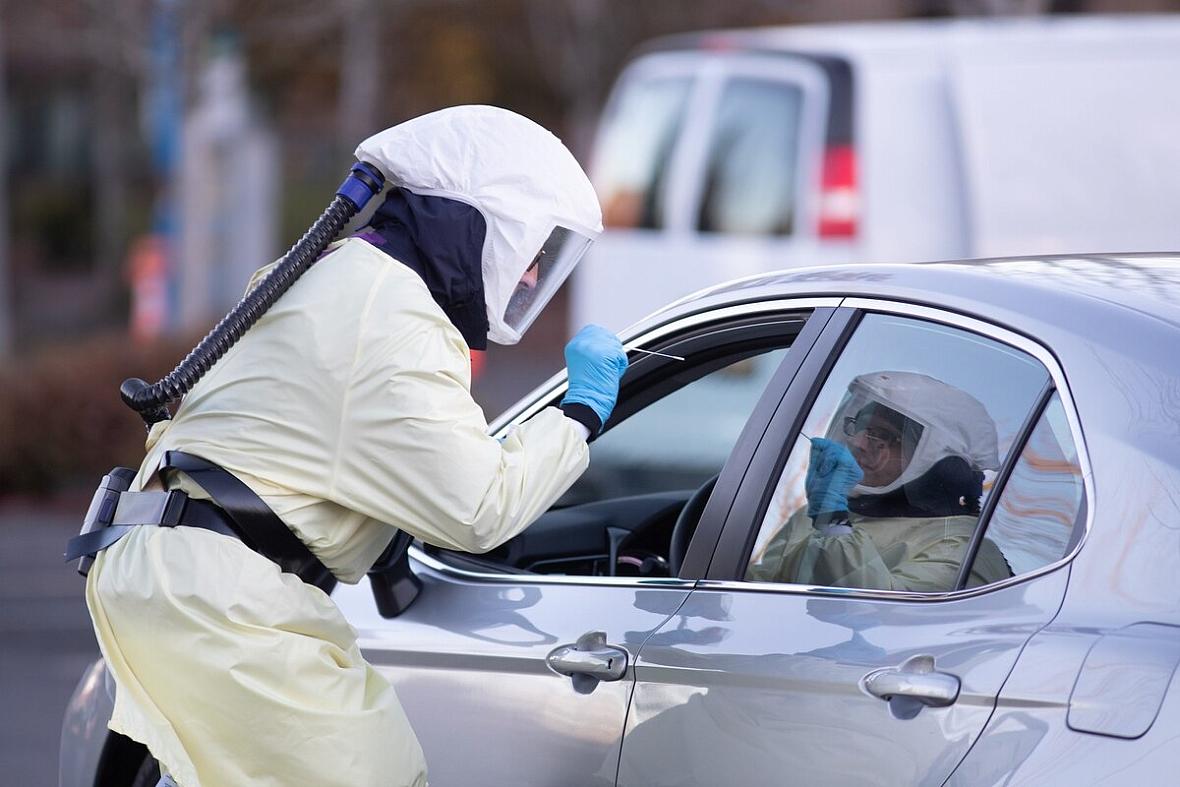These Two Doctors Provide the Last Signatures Before Oregonians Get a COVID-19 Vaccine
This story was produced as part of a larger project led by Rachel Monahan, a participant in the 2020 National Fellowship.
Read her other stories here:
Mimi Luther Dreads the Prospect of Flu Season Mixed With a Pandemic. She Begs You to Get a Flu Shot.
Prominent Anti-Vaccine Pediatrician Dr. Paul Thomas Has License Suspended by the Oregon Medical Board
Ending the Pandemic Means Getting Vaccinated. But Many Oregonians Will Be Hard to Convince.

Drive-thru COVID-19 testing clinic at Portland Community College Cascade campus on Dec. 2.
(Motoya Nakamura / Multnomah County)
On Dec. 4, the Oregon Health Authority requested 15,600 doses of Pfizer's COVID-19 vaccine from the federal government. It's the job of two doctors to assure Oregonians the shots are safe.
Dr. Louis Picker, an Oregon Health & Science University professor who has worked on an HIV vaccine, and Dr. Laura Byerly, medical director of the Virginia Garcia Memorial Health Center, are the two experts Gov. Kate Brown appointed last week to review safety data for any COVID-19 vaccines approved by the U.S. Food and Drug Administration.
They join a panel of experts from four Western states—California, Nevada, Oregon and Washington—who are looking to provide another level of assurance to the public in a politically tumultuous moment.
For some Oregonians, the vaccine is inextricably linked to election-year partisan politics. President Donald Trump pledged a COVID vaccine would arrive before Election Day thanks to "Operation Warp Speed." It didn't, and he lost. But people on both sides of the aisle still view the vaccine with greater skepticism. And the panel of experts will review the approvals provided by the Trump administration.
WW asked the doctors why we should trust them—and the vaccine.
Dr. Louis Picker
WW: Why would the governor choose you?
Picker: I am not actively engaged in COVID-19 vaccine development, but I'm very familiar with the vaccines that are being developed, mainly because the vaccine backbones that are used—many were originally developed for HIV.
We've had decades to develop a vaccine for HIV and we don't have one, and yet we have one within a year for COVID-19. Can you explain that?
It's actually quite easy to explain. The immune systems of humans aren't able to clear HIV. They never get rid of it. Getting an HIV vaccine requires us to develop a vaccine that elicits an immune response that is better than nature. That's not true for COVID-19. It very clearly is controlled by the immune system.
Would you take the vaccine in the next few weeks if you were a frontline doctor?
Absolutely. I'd put my arm out right now—I mean, if it's approved, and I expect it will be.
So will COVID research help in the development of HIV and tuberculosis vaccines?
What I hope happens is that the COVID example shows what can be done. I hope what this does is supercharge [the] imperative to say that was last century's pandemic, that's still here. We need to get rid of it. And we need to get rid of tuberculosis, which is an age-old pandemic that still has killed more people this year than COVID.
Dr. Laura Byerly
WW: Why would the governor choose you?
Byerly: I am there as a person who's been giving vaccines to a vulnerable community for a long time. So I'm hoping to [be a] bridge—to say, "Yes, we can trust what's happening."
Would you take the vaccine?
I am feeling much better than I would have a couple months ago. I feel like there's transparency. When things are getting glitched, we're hearing about it.
Why does it give you faith that there have been glitches?
What was worrisome about the vaccine timeline being pushed and politicized was that things would be swept under the rug. And it appears that dumb mistakes are coming out. Having all of that out in the open just makes me feel like, well, I think that there's not that many bad things happening in the time frame we have to work with.
What else should people know about vaccines that they don't?
Getting a vaccine is always an expression of brotherly love. It's always a slight risk to one's own self to be part of a larger community, to keep the whole community healthy.
I would say, show that love one way or another—either wear your mask, avoid doing things that could expose another of your humans to coronavirus, or get a vaccine as a way to do that.
That piece of our interactions is getting really squelched lately. Do it for each other.
Rachel Monahan reported this story with the support of the Dennis A. Hunt Fund for Health Journalism, a program of the USC Annenberg Center for Health Journalism's 2020 National Fellowship.
[This story was originally published by Willamette Week.]

